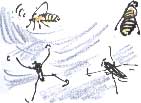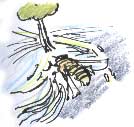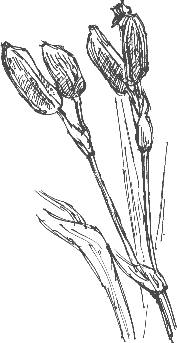 It's
great to get back to normal things like sitting here by the pond with
a colander of broad beans and podding them, removing the bean from the
soft, squishy velvet that lines the pod. It's
great to get back to normal things like sitting here by the pond with
a colander of broad beans and podding them, removing the bean from the
soft, squishy velvet that lines the pod.
I'd reached a stage with my Norfolk booklet where I felt I could break
off and spend and afternoon catching up in the garden. In two or three
hours I've trimmed and hacked my way halfway down the hedge, past the
pond as far as the broad beans.
Ever decreasing circles
 A
stripy bee, perhaps a mining bee, gets stuck on the surface
film of the pond. Attempting to fly it merely spins in small circles,
like an out-of-control speedboat. A
stripy bee, perhaps a mining bee, gets stuck on the surface
film of the pond. Attempting to fly it merely spins in small circles,
like an out-of-control speedboat.
 Along
come the predatory pond skaters. Six or seven of them
gather around it, like hyenas watching a stricken wildebeest. Perhaps
it's the yellow and black stripes, perhaps it's the vigour of the trapped
insect's movements, but they keep a safe distance, in a circle several
inches from it. Along
come the predatory pond skaters. Six or seven of them
gather around it, like hyenas watching a stricken wildebeest. Perhaps
it's the yellow and black stripes, perhaps it's the vigour of the trapped
insect's movements, but they keep a safe distance, in a circle several
inches from it.
Moving in ever decreasing circles the bee eventually finds itself by
the floating roots a water plant and, wet and bedraggled, it staggers
to safety.
 Iris
Pods Iris
Pods
I've been intending to try working in dip pen and india ink again for
some time now and these seedpods of the purple iris growing
in the pond are a favourite subject for me at this time of year. Simple
forms that I can draw quite quickly (compared, say, to drawing the more
complex ferns growing nearby).
I find that the dip pen seems to make me work more quickly. Perhaps it's
the fear that the ink is going to dry up on me, perhaps it just flows
more easily than some pens might. I'm using the nature journal that I
started recently which has smooth paper in it and that probably helps
too.
Curiously I've read somewhere that some of the Victorian illustrators,
like Tenniel who illustrated the Alice books, who you might think
always worked with a dip pen in fact worked with a brush, presumably a
fine brush, dipped in ink.
I'll have to give that a try too. 
Richard Bell, richard@willowisland.co.uk
|